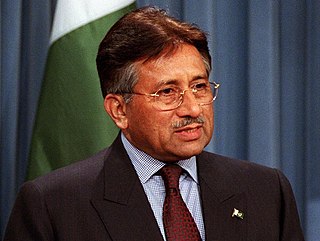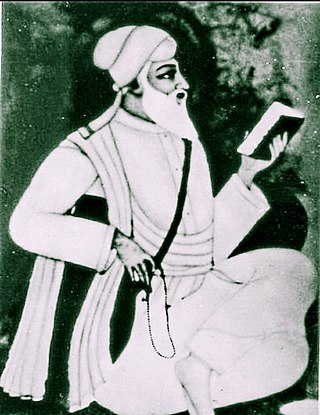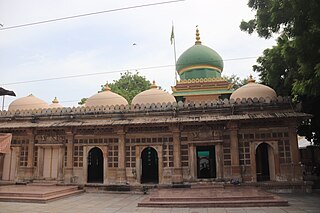Related Research Articles
Hafiz, depending on the context, is a term used by Muslims for someone who has completely memorized the Quran which consists of 77,797 words in the original Classical Arabic. Hafiza is the female equivalent.
The Memon are a Muslim community in Gujarat India, and Sindh, Pakistan, the majority of whom follow the Hanafi fiqh of Sunni Islam. They are divided into different groups based on their origins: Kathiawari Memons, Kutchi Memons and Bantva Memons from the Kathiawar, Kutch and Bantva regions of Gujarat respectively, and Sindhi Memons from Sindh.

Memoni is an Indo-Aryan language spoken by Memons, from the Kathiawar region of Gujarat, India. Memon from Okha Port, Kutch and some other communities from Kathiawad also use Memoni at their homes.

An indirect presidential election was held in Pakistan on 6 October 2007. This was before dissolution of parliament for the following general election to be held in 2008. The Pakistani legislature elected incumbent Pervez Musharraf by an overwhelming majority. The near-unanimous nature of Musharraf's victory was made possible by the absence of two key political opposition leaders, Nawaz Sharif and Benazir Bhutto. Nawaz Sharif had attempted to return to Pakistan before the election but was deported back into exile by the ruling government because of a gross violation of the agreement he had signed with the current regime to stay out of Pakistan and its politics for a period of ten years. Benazir Bhutto had also announced her intention to return to Pakistan for the elections but ultimately decided not to do so. It was widely assumed that her decision was the result of an arrangement she made with Musharraf.
Mohan is a town and a nagar panchayat in Unnao district in the Indian state of Uttar Pradesh.
Raza Academy is a Sunni Muslim fundamentalist Islamist group based in Maharashtra, India. It was formed in 1978 by Alhaj Mohammed Saeed Noori as a small publishing house, and later became known for protests for the rights of Muslims. The group publishes books of Barelvi scholars in various languages, the Kanzul Iman translation of the Quran, and Fatawa-i Razawiyya. The group also conducts charity and advocacy work for the Muslim community.

Wajihuddin Ahmed is a retired senior justice of the Supreme Court of Pakistan, human rights activist, and former professor of law at the Sindh Muslim Law College.

Hashim Peer Dastagir was an Indian Sufi saint belonging to the Qadri Shattari order. His shrine is in Bijapur, Karnataka, India.
Bada Kabarastan, is a Muslim cemetery in the Marine Lines area of south Mumbai in India. One of the largest Muslim cemeteries in the country, it is also the final resting place of a number of icons from various walks of life including Nargis, Madhubala, Suraiya, Haji Mastan, Karim Lala, Yakub Memon and Baba Siddique.
Shair is the oldest Urdu-language literary magazine, based in Mumbai, India. It was launched in Agra in 1930 by the famous poet Seemab Akbarabadi. Its editor-in-chief is the poet, writer and journalist Iftikhar Imam Siddiqui, and the assistant editors are his two brothers, Noaman Siddiqui and Hamid Iqbal Siddiqui.

Syedna Ibrahim Wajihuddin Bin Syedi AbdulQadir Hakimuddin was the 39th Dā'ī of the Dawoodi Bohras. He succeeded the 38th Dā'ī Syedna Ismail Badruddin II to the religious post.

Syedna Hebatullah-il-Muʾayyad Fiddeen bin Syedna Ibrahim Wajihuddin was the 40th Dā'ī al-Mutlaq of the Dawoodi Bohra sect. He succeeded his father, the 39th Dā'ī al-Mutlaq, Syedna Ibrahim Wajihuddin to the religious post.

Aslam Kiratpuri, is an Urdu journalist, artist and a professional Lahori Nastalique calligrapher. Kiratpuri creates his calligraphic Toghras, intricate works of calligraphy in different styles using verses from the Quran along with various geometric and floral designs. He is the only Lahori Nastalique style calligrapher in India.

Presidential elections were held on 30 July 2013 in Pakistan to elect the 12th President of Pakistan. Incumbent President Asif Ali Zardari’s term was scheduled to expire on 8 September 2013; and as such, Article 41 of the Constitution of Pakistan required the elections to be held no later than 8 August 2013. The Electoral College of Pakistan – a joint sitting of the Senate, National Assembly and Provincial Assemblies – were tasked with electing a new president to succeed President Zardari, who declined to seek a second term in office. After the Pakistan Peoples Party and its allies boycotted the presidential election, the two candidates were Mamnoon Hussain backed by the Pakistan Muslim League (N), and Wajihuddin Ahmed backed by Pakistan Tehreek-e-Insaf. Agra-born Hussain was elected president by a majority securing 432 votes. The elections were the first time in Pakistani history where a civilian president was elected while an incumbent civilian President was still in office, completing a historic and democratic transition of power that began with the 2013 General Elections.

Shah Wajihuddin Alvi Gujarati, also known the epithet Haider Ali Saani, was an Islamic scholar and Sufi in the Shattari order.

Wajihuddin's Tomb or Hazrat Wajihuddin Dargah, is a tomb of Sufi saint Wajihuddin Alvi in Khanpur area of Ahmedabad, India.

The Jama Masjid Nerul or Nerul Aalami Markaz is a mosque located in Nerul, Navi Mumbai, Maharashtra, India. It is the oldest, largest mosque in Nerul & one of the main mosques of Navi Mumbai. It serves as the headquarter for the shura faction of the Tablighi Jamaat and is led by scholars like Ahmad Laat and Ebrahim Dewla.
Aḥmad Alī Sahāranpūrī was an Indian hadith scholar who played a key role in publishing hadīth literature in India. He was among the early teachers of Mazahir Uloom, and is often credited as a founder for his contributions to the development of the seminary. His students include Muhammad Qasim Nanautawi and Shibli Nomani.

Shaikh Farid Bukhari, also known by the title Murtaza Khan, was a leading Mughal noble of the 17th century. He served as mir bakhshi of the empire during the reign of the Mughal emperor Akbar. During the reign of Akbar's successor Jahangir, he played a key role in the suppression of prince Khusrau's rebellion, and later governed the provinces of Gujarat and Punjab. He was also well known as an architectural patron in Mughal India, and founded the city of Faridabad in modern-day Haryana, India.
References
- ↑ "Wajihuddin". ESPN Cricinfo. Retrieved 29 November 2015.